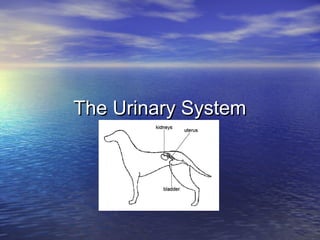
Urinary system
- 2. The Urinary System • The Urinary System consists of – The kidneys (and blood vessels entering and leaving them) – The ureters – The bladder – The urethra
- 5. • Renal Arteries – Carries blood into the kidneys. This blood contains excess water and salts, along with urea which was made in the liver • Kidneys – Removes excess water, salts and urea from the blood. These compounds combine to form urine • Renal Veins – Takes blood away from the kidneys back to the heart. This blood contains no waste material
- 6. • Ureters – Tubes which carry urine from the kidney to the bladder • Bladder – Stores the urine until it can be released from the body • Urethra – The tube which takes urine from the bladder and out of the body
- 7. OB20 understand the structure and function of the urinary system: bladder, renal artery, renal vein, ureter, urethra and kidney renal vein renal artery ney kid ureter bladder urethra urethra
- 8. OB20 understand the structure and function of the urinary system: bladder, renal artery, renal vein, ureter, urethra and kidney renal artery carries blood to kidney renal vein carries blood from kidney kidney filters blood to remove urea ureter transports urine to bladder bladder bladder stores urine urethra releases urine urethra
- 9. Match the following parts of the Urinary system with their function: A. Renal 1. releases urine vein B. Ureter 2. carries blood to kidney C. Bladder 3. filters blood to remove urea D. Kidney 4. transports urine to bladder E. Urethra 5. stores urine F. Renal 6. carries blood from kidney artery
- 10. The Kidney
- 11. 1. Blood containing water, salts and urea enters the kidney 2. Urea, some salts and water are removed from bloodstream by kidney and form urine 3. Urine leaves the kidney in the ureter
- 12. OB23 recall that waste products are removed from the bloodstream by filtration in the kidneys in the form of urine, which contains urea, water and salts water 2 salt urea, some salts and water urea are removed from bloodstream by kidney and 1 form urine blood containing water, salts and urea enters the kidney 3 the urine leaves the kidney in the ureter
- 13. Rewrite the following stages of filtration in the kidneys in the order that they occur in the body: A. the urine leaves the kidney in the ureter B. urea, some salts and water are removed from bloodstream by kidney and form urine C. blood containing water, salts and urea enters the kidney
- 14. OB23 urine is stored in the bladder before being released from the body urethra
- 16. A section through the kidney shows an outer darker region (cortex) and a lighter inner zone (medulla). Cortex Pelvis Medulla Ureter
- 17. LEARNING CHECK – Identify Cortex, Medulla, Pelvis, Ureter D A B C A = Cortex B = Medulla C = Ureter D = Pelvis
- 18. The kidneys work by filtering the blood and then absorbing back what the body needs to keep. The wastes are allowed pass to the bladder, for storage and release. Filtration Pelvis Cortex Reabsorption Medulla Ureter As urine is produced, it flows into the renal pelvis, then into the ureter, to the bladder.
- 19. Filtration—In the outer cortex, small molecules like glucose, amino acids, water, urea and salts filter out of the blood into narrow tubules. Reabsorption—blood vessels reabsorb back useful nutrients from the tubules. Urea, excess salts and water, are allowed to continue down the tubule and on to the bladder.
- 20. Secretion is the production and release of chemicals from cells. Some substances, especially potassium and hydrogen ions, are secreted from the blood into the tubule in the cortex region. When the blood becomes too acidic, hydrogen ions are secreted into the urine. By controlling the hydrogen ion concentration in the blood, the kidneys control blood pH.
- 21. Homeostasis – Water Levels in the Body Land animals have a continuous need to conserve water. Water must be taken in daily and its loss must be carefully regulated. Water is taken in as food and drink, and is also formed inside the cells during some reactions, especially respiration. Water is lost from the body through our lungs, skin, intestines and kidneys.
- 22. Water is lost from the body through a number of ways: Lungs – some water gets evaporated as we exhale from our warm, damp lungs. Skin – by evaporation from cells and through sweat. Intestines – in the faeces (undigested food). Kidneys – in dissolving the poisons and wastes we wish to excrete from the body.
- 23. We have no control over the amount of water lost each day from the lungs, skin or intestines. So the kidneys are the water control (osmoregulatory) organs of the body – conserving or eliminating water as the body requires.
- 24. Renal Disease • Due to damage of the kidneys • 2 kinds – Acute • Caused by trauma, severe dehydration or circulatory failure • Signs include vomiting, Urea in blood, Lethargy and Diarrhoea • Treatment involves fluid therapy and dialysis – Chronic • Caused abnormalities in the kidney or metabolic disorders • Occurs over a long period of time. Signs are same as Acute • Treatment in involves solving the original cause